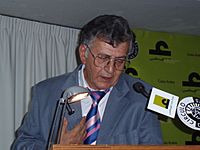Samih al-Qasim facts for kids
Quick facts for kids
Samīħ al-Qāsim
|
|
|---|---|

Samīħ al-Qāsim in Madrid
|
|
| Native name |
سميح القاسم
סמיח אל קאסם |
| Born | May 11, 1939 Zarqa, Emirate of Transjordan (now Jordan) |
| Died | August 19, 2014 (aged 75) Safed, Israel |
| Occupation | Poet and writer |
| Nationality | Palestinian |
| Period | 1958-2014 |
| Genre | Nationalist, tragedy |
Samīħ al-Qāsim (Arabic: سميح القاسم; Hebrew: סמיח אל קאסם; 1939 – August 19, 2014) was a famous Palestinian Druze poet. His writings are well known across the Arab world. He was born in Transjordan and later lived in Mandatory Palestine and Israel. Before 1967, his ideas were mainly shaped by Arab nationalism. After the Six-Day War, he joined the Israeli Communist Party.
Contents
A Poet's Early Life
Samīħ al-Qāsim was born in 1939 in Zarqa, a city in what was then called the Emirate of Transjordan. This area is now part of Jordan. His father was serving in the army of King Abdullah at the time.
Al-Qāsim came from a Druze family. They lived in the town of Rameh in the Upper Galilee region. He went to primary school there and later finished high school in Nazareth. His family stayed in Rameh during the events of 1948, known as the Nakba.
In one of his books, About Principles and Art, he wrote about this time. He said that the "Palestinian tragedy" happened when he was still in primary school. He felt that this time marked his true birth. The first memories he had were from the events of 1948. He explained that his thoughts and ideas came from that year.
Life as a Writer and Journalist
By 1984, Samīħ al-Qāsim had written many books of poetry. He published six collections of his poems. His poems were often short, sometimes just two lines long.
Some of his well-known poems include:
- Sons of War
- Confession at Midday
- Travel Tickets
- Bats
- Abandoning
- The Story of a City
- Conversation between Ear of Corn and Jerusalem Rose Thorn
- How I became an Article
- Story of the Unknown Man
- End of a Discussion with a Jailer
- The Will of a Man Dying in Exile
- The Boring Orbit
- The Clock on the Wall
Al-Qāsim also wrote for several newspapers and magazines. These included Al-Ittihad, Al-Jadid, and Index. He said that the idea of Nasserism, which promoted unity among Arab nations, greatly influenced him. This was especially true after the events of 1948.
Much of his poetry talks about how life changed after the Nakba. It also covered the struggles of Palestinians and Arabs to gain freedom. He wrote about Arab nationalism and other sad events in Arab history. In 1968, he released his first collection of poems called Waiting for the Thunderbird. He wrote about these topics when they were very popular among Arab people in the late 20th century.
Once, his friend, the Iraqi poet Buland al-Haidari, asked him if he had visited Baghdad. Al-Qāsim replied that he did not need to. He felt that any Arab city was like his own home.
His Political Views
Al-Qāsim believed in the idea of pan-Arabism. This is the idea that all Arab people should be united. He was put in prison several times because of his political actions. These actions included speaking up for Palestinian rights. He also disagreed with some government policies.
His first time in prison was in 1960. This was because he refused to join the Israeli army. Joining the army was required for Druze citizens in Israel. He was also sometimes kept under house arrest.
In 1967, he joined the Israeli Communist party Hadash. He was held in prison with other party members when the Six-Day War began. He was sent to al-Damoun prison in Haifa. During this time, he felt a change in his nationalistic feelings. This happened when he heard Israeli radio announce their victories in the war.
Life in Israel
Samīħ al-Qāsim worked as a journalist in Haifa. There, he managed the Arabesque Press and the Folk Arts Centre. He was also the main editor of the Israeli Arab newspaper Kul al-Arab.
He often read his poems to large groups of people. These gatherings happened every month in Arab towns and cities in the Galilee region. Al-Qāsim chose to stay in his homeland. In an interview with Index magazine, he said: "I have chosen to remain in my own country not because I love myself less, but because I love my country more."
Al-Qāsim visited Syria in 1997 and again in 2000. In 2001, Israeli authorities stopped him from traveling to Lebanon for a poetry event.
His Passing
Samīħ al-Qāsim passed away on August 19, 2014. He had been battling cancer for a long time. His funeral was held on August 21, 2014, in his hometown of Rameh.
See also
 In Spanish: Samih al-Qasim para niños
In Spanish: Samih al-Qasim para niños
 | Emma Amos |
 | Edward Mitchell Bannister |
 | Larry D. Alexander |
 | Ernie Barnes |

